US nursing home data shows clearly that the COVID vaccines made the elderly MORE likely to die from COVID. Whoops!
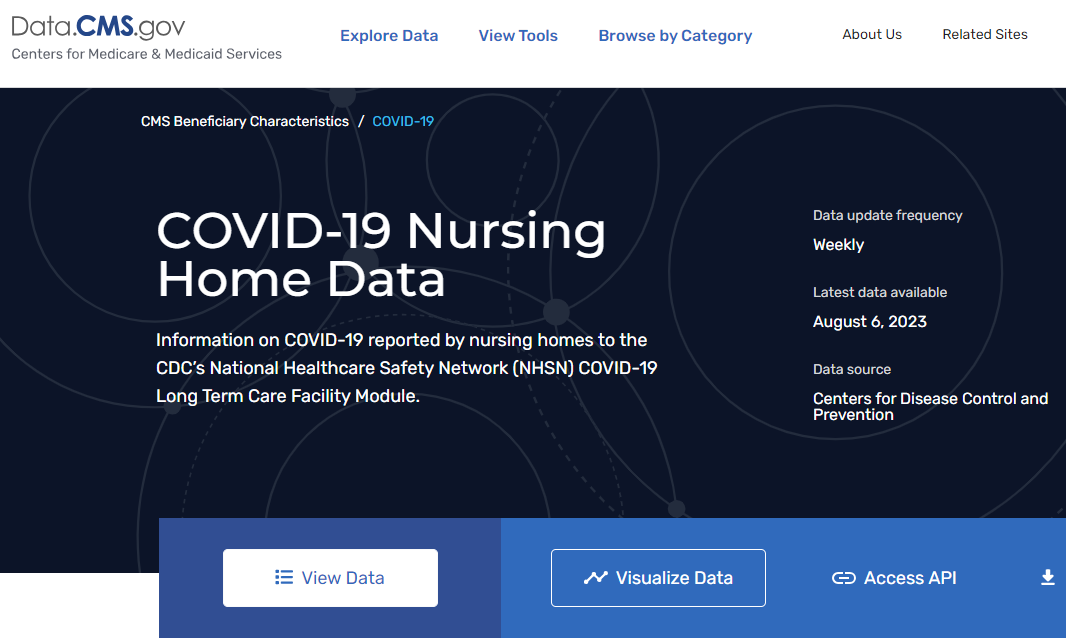
Abstract
This is a very important article. Perhaps the most important article I’ve written to date.
In a nutshell, I analyzed the “gold standard” official US nursing home data and gave the vaccine every benefit of the doubt by analyzing it under “best case conditions” when the vaccine matched the variant, and soon after the vaccine was given so that it would be before the protection waned and a booster would be required. If the vaccine worked as claimed, there should have been a huge drop in the infection fatality rate (IFR) and this data would be covered in every mainstream media outlet in the world.
This didn’t happen because the data clearly shows the opposite: a dramatic increase in the IFR post vaccination; it nearly doubled: odd ratio (OR)=1.45.
There is no way for them to explain this away. This is why the CDC never referenced this data even though it has been available for years.
If this data could be analyzed in any way that is positive for the vaccine, they would have done this.
So you don’t even have to read my analysis or even agree with any of it; the very fact that they have said nothing in the 2 years since this data was first made available about THE SINGLE MOST IMPORTANT “gold standard” data shows you CLEARLY that the data didn’t support their narrative.
Executive summary
We finally have the “gold standard" ground truth data that nobody can argue with showing that the COVID vaccines were a disaster for the elderly, the very population they were meant to protect.
The source of the data? Weekly infection, mortality reports from over 15,000 US nursing homes who were required to report their numbers to Medicare (aka CMS).
What makes this so important is that around 40% of the COVID deaths were in nursing homes. So nursing home COVID infection and death data is the “holy grail.” You cannot get any better than this.
And we set up the analysis to look when the variant matched the vaccine, and limited our analysis to the few months after vaccination before immunity starts to wane. So we set up the vaccine for success. We did everything possible to find the strongest possible signal of effectiveness.
So if this data is bad, it’s all over. There is no place to hide.
And the data is bad. Really bad. It would be hard to analyze this data and show it is a success.
CMS made a huge mistake by making the US Nursing home COVID data public where anyone who wanted to know the truth could analyze. Data transparency means that the truth is in plain sight. That’s really bad for the narrative.
So I did what any respectable “misinformation superspreader” would do… I downloaded the data and analyzed it.
I analyzed the data using 3 different methods (see my Excel spreadsheet) that I thought would be fair and objective and the results were consistent. If the vaccines really worked, the IFR in the months after the vaccine (after a waiting period) should have plummeted, but it went up by 20%.
In addition, an analysis of elderly facilities in Ireland was fully consistent with what my analysis found: death rates in nursing homes skyrocketed right after the vaccines rolled out.
The CMS data shows that the vaccines were a disaster for the elderly 3 different ways:
Short-term death rate of 25% or more: People died instantly or shortly after the shot was given. For example, at Annandale Care Center, MN, 8 people died on the day of the shot. The facility only has only 60 beds but at the time the facility was less than half full at 29 beds. So that is HUGE. That’s a same day death rate from the jab of 28% if everyone got the jab and it’s a higher rate if not everyone got the jab. This is crazy dangerous. But not all facilities get the same batch so that’s why the same-day kill rate can be very high at a single facility and lower at other facilities. Note: Annandale Healthcare Center was in the news and is a much larger facility, but is not the facility I just described, so be careful when fact checking this.
Up to 2X higher likelihood of dying from COVID short term and an increased risk of catching COVID as well: Residents got a compromised immune system from the jab, so they got COVID and died from COVID in record numbers. For example, at Apple Valley Village Health Care Center (AVV) in MN, there were 90 COVID cases in the first 3 weeks of Jan 2021, and at least 28 people died as a result of those infections. Yet in all of 2020, there were just 27 COVID cases and not a single death from COVID. At AVV, they went from a 0:27 death:infection track record (pre-vax) to 28:90 in just 3 weeks right after the jab was given at the end of December 2020. Same facility. Same COVID variant. Why was the COVID infection-fatality rate (IFR) so drastically different with the same variant, the same facility, and the same resident population? I wanted to know the answer to that but everyone at AVV refused to return any of my calls. But we see this in other places. The only thing that makes any sense is that it was the vaccine because it checks all the boxes. No other hypothesis has been offered. The good news is the doubling of the COVID IFR appears to be temporary as the IFR was only 20% higher in the months after the shots were given.
Up to 34% higher overall mortality risk for years post-jab: The jabs have permanently (or at least long term) weakened the immune system of all the recipients, young and old, so they are dying at a higher rate overall post-jab. On a small scale, you can see this in the Apple Valley deaths, for example (see the Apple Valley section below). On a larger scale, you can see this in all the excess deaths being reported such as BBC headlines the UK having their highest excess deaths in 50 years or in this article showing that kids 35-44 year olds are now dying at a rate 34% higher than before. That is a MASSIVE change. How can medical authorities be unable to explain the cause and fix it? Simple: they are not permitted to blame the vaccine so this will be a mystery forever. And they will never reveal the vaccination status of the kids who are dying because that would be a privacy violation. However, if you are unvaccinated and die, the news media is free to report that. Have you noticed that for all these sudden deaths and cardiac arrests, they never say “…and he was not vaccinated.”
The only good news was that the number of COVID infections dropped which means the COVID deaths dropped which resulted in a big drop in the all-cause mortality. Could this have been caused by the vaccine reducing the risk of infection? Yes, it’s possible. But we have excellent studies, such as the Cleveland Clinic study, showing the vaccine does the opposite: making you more likely to get COVID. And in nursing homes where we could validate the data from an insider, we learned that both the COVID rates and IFR dramatically increased right after the vaccine; this one facility cannot be explained away as a “fluke.” So the most likely hypothesis is that the virus simply burned itself out (and we see the ebb and flow of the COVID case rates over time where we actually got higher highs compared to the pre-vaccine period which is consistent with the studies (like the Cleveland Clinic study) that the vaccine made things worse).
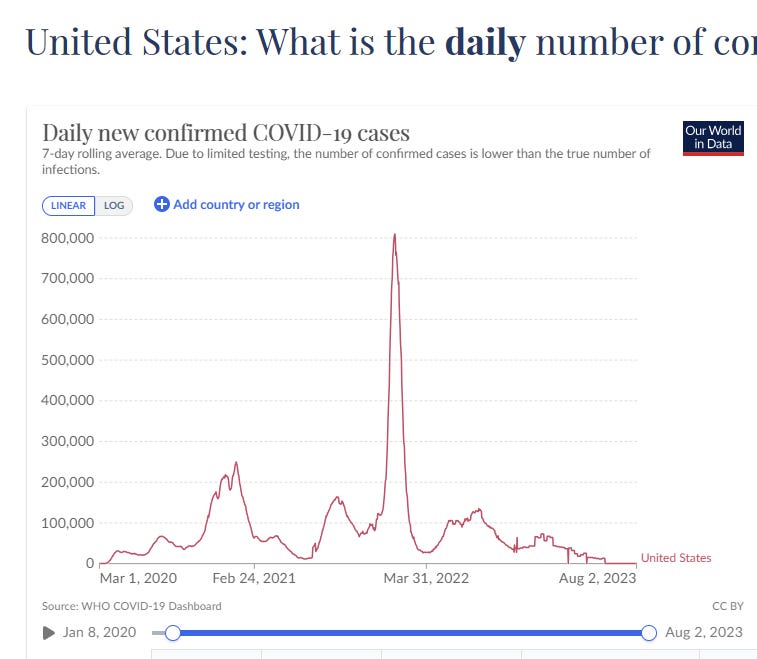
The biggest surprise for me in viewing the data was the huge variation in the IFR even in the same month of the year between facilities, even those with high numbers of cases (where you would expect to see the most consistent numbers). This suggests that the vaccine batches are variable or there is something else going on. Some vaccine batches make you highly susceptible to getting COVID and/or dying shortly after the shot, and other batches are duds.
While batch variability is negatively impacting outcomes, it doesn’t seem like it works the other way, i.e., that any vaccine batches are actually improving outcomes. I only hear negative stories. When I ask for specific named facilities with a success story, I hear crickets.
Before we get into the analysis, here’s some of the feedback I’ve received on this article
“Excellent. That's a really important piece. In a sane world this would be game over. It is criminal.” — Clare Craig
“You are right.” — Norman Fenton
There were a lot more, but you get the idea.
But here’s the key point: my analysis doesn’t even need to be correct. The very fact that NOBODY has ever published an analysis of this data showing the vaccines reduced IFR after the vaccine rollout in nursing homes in Dec 2020 tells you everything you need to know.
If the vaccine worked, we would be seeing dozens of such papers.
A note to fact checkers: your guide to debunking this article
Simply complete all the items in this checklist.
Compute the actual OR for COVID death:survivor for the period immediately before the vaccine vs. after the vaccine rollout. I got 1.45 as shown in my Excel spreadsheet. Please show your data and formulas just like I did.
If you think you cannot calculate an IFR, show us the actual data that shows that the data that CMS collected is confounded. Explain precisely what the confounder is, adjust the data for the confounder, and show us the revised analysis showing the IFR actually plummeted after the vaccine rollout.
If you are making the unfounded claim that a large number of people came “into the system” from outside and stopped being tested upon admission in just the month of February 2021 (which could explain an IFR increase if there is supporting data), please show us your data proving that. The nursing homes I’ve talked to test every new admission and they test those people who are symptomatic. What is the explanation for the IFR nearly doubling after the vaccine rollout?
Show us one or more analyses of the CMS Nursing Home Medicare data published in the peer-reviewed medical literature showing that the vaccines REDUCED THE IFR after it was administered or resulted in an OR value that was <1.
If no such papers exist, you need to explain why there isn’t one because the data has been publicly available since July 21, 2021. Why would the CDC ignore such a rich dataset that would prove that the vaccines work if it worked?
Explain what happened at Apple Valley Village (see below). If it wasn’t the vaccine, what caused all these events (workers called in from holiday to deal with all the deaths right after the vaccine was given and an IFR that went from 0 to 33% right after the shots were given)? It sure didn’t happen by chance so how do you explain the observations all of which are verifiable by third parties (and/or third party data).
Please publish your data backing up your analysis on a website or Github. After all, as a fact checker, you shouldn’t be afraid of anyone checking your work.
The data has been on the website for 2 years and nobody can explain it with an argument that is actually backed by data?
The bottom line is this: the raw data shows a huge signal in the wrong direction.
If you want to make the signal “go away” you need to either:
Delete the offending data from your study so you get the result you want (this is the technique used by the CDC in the pivotal DeStefano paper)'
Name the specific confounder and reanalyze the data “correctly” and show us the correct analysis with the confounder taken into account. Is it that in 1% of the reports that the cases were under counted? How does that change the OR? Show the data proving this.
You’ll need to explain the anecdotes like Annandale with a 28% death rate on the day of the shot and AVV where the IFR was 0 until the shots rolled out and then it jumped to a nearly 30% death rate. Those are statistically impossible if the vaccine is dramatically lowering the IFR. You cannot dismiss these as anecdotes. They are evidence that is verifiable.
When you have a huge raw data signal like this, massaging it away is extremely difficult especially when there is no confounder available that could significantly move the needle on the odds ratio.
Good luck with that.
Analysis methods
My Excel spreadsheet has tabs with 3 different analyses:
Overall odds ratio for dead:alive
Year-to-date odds ratio change
Before vs. after vax Odds ratio (OR)
Change in the monthly values for IFR
They all showed the vaccine was a complete failure. In the period after the vaccine, you were simply more likely to die if you got COVID.
The analysis focused on showing that the vaccine made you more likely to die from COVID. Once you show that, it’s all over. All three analyses were consistent. They all showed that the IFR was around 20% higher after the jab. I calculated a p-value for analysis #3 and it was 3e-16, so it’s unlikely this happened by chance.
But the vaccine itself killed a large number of people as evidenced by the same day kill rate at places like Annandale where 8 people died on the same
The only good news was that the number of infections dropped which means the COVID deaths dropped which resulted in a drop in the all-cause mortality. But this was more likely due to the virus burning itself out via herd immunity for the current variant than anything that the vaccine could have done since the vaccine doesn’t provide infection or death protection; it does the opposite.
Limitations
The Medicare data does not list the vaccination status of the people who died from COVID. However, this doesn’t matter. At nearly every nursing home, vaccination rates were 90% or more. The status of specific individuals doesn’t matter since the IFR has to drop dramatically after the vaccines roll out if the vaccines work to prevent death from COVID. So the vaccination status of individuals is irrelevant. It would have made this analysis even more obvious if we had that data, but Medicare conveniently does not collect it. I wonder why?
There are a small percentage (<1%) of nursing homes where the number of COVID deaths exceeds the number of COVID infections. There are several reasons this can happen which are explained in the FAQ section of the CMS page. Some of these are undiagnosed at the time of death, others are transfers from outside the nursing home system (such as from a residence, hospital, etc). It’s possible that some people, when brought into the nursing home system are not tested, but since this was a time of high COVID awareness and COVID deaths, it would be very unlikely that a newly admitted person wouldn’t be screened prior to admission or shortly thereafter. In fact, even today, nursing homes test new admits for COVID and test you if you are symptomatic. But for transfers, in the aggregate analysis, this doesn’t matter because these all disappear since aggregate numbers are not facility specific. And aggregate data would count any person who transfers with COVID twice which would reduce the IFR. Any such errors are random and would affect all data and all months equally. There would be no rational explanation for this effect being “selective” and only affecting months pre-vaccine or post-vaccine. Anyone who is relying on this argument needs to actually show data that the incidence of this happening was not randomly distributed and made a material difference in the final numbers. Nobody can do this so they instead rely on “hand waving” arguments to dismiss the data. There were fewer than 0.6% of the entries where the number of infections were less than the number of deaths. In order to minimize the effect of these outliers, I added a condition that increased the case count to at least the number of deaths so the IFR of any entry would never exceed 1. Increasing case count always lowers the IFR. There was still a strong signal post-vaccine. I analyzed the data many different ways; if there was any kind of success signal for the vaccine, I believe I would have found it. I encourage everyone to do your own analysis with your own reasonable data restrictions and prove that I got it wrong. Any honest researcher would publish their methodology prior to looking at the data and agree to be bound by what the data shows. But there are few honest researchers left in science. For non-clinical trials, people could use a GitHub repo as proof of methodology prior to analysis and collection of data. For clinical trials, there is clinicaltrials.gov which registers the protocol. I’d have done this myself on this analysis if I had thought of it. However, all my revisions are in OneDrive as a permanent record. Under penalty of perjury, I will happily attest in a court of law that none of the analyses I did produced an OR that would show that the vaccine made things better.
There are data quality issues. For example a site might have entered 90 instead of 9 by mistake. I didn’t look at all 1M entries to detect these. So there can be errors that shift the results one way or another. This is precisely why I didn’t just rely on a single method of analysis, but also considered methods that would diminish the effect of spurious data such as analyzing the effects per site and counting the number of sites that got better vs. worse. There are parameters you can set to limit the maximum values a given site can contribute to the total in a given month. The default is set to 200/100 (look at columns Y and Z). You can raise these or lower these to see the impact of data quality issues on the results. Basically, for pretty much any choice of these QA parameters, the vaccine is still a disaster. It had to be that way because if the vaccines were safe and effective, Apple Valley Village cannot be explained.
Due to the limitations and just to be in general very careful, it’s important to study individual anecdotes where full data can be obtained directly from people who worked at the facility to verify what happened.
This is why data such as Apple Valley Village is so helpful because we know for a fact what happened there and it validates what the numbers tell us; the experience at that one facility alone is impossible for anyone to explain if the vaccines are safe and reduce the death rate from COVID (i.e., lower the IFR).
This is why nobody who works there will return any of my calls. What happened at that facility cannot be explained if the vaccines are safe and reduced IFR and didn’t kill anyone. I have death records, the full Medicare records from HHS, and the CMS Nursing Home data that is published, in addition to evidence from insiders who work and worked there.
So anyone claiming that the limitations make the data totally unusable is gaslighting you and at a minimum must explain the Apple Valley Village case because it aligns perfectly with what the Nursing Home Data is saying.
Overall odds ratio
This is on the IFR tab of the spreadsheet.
I simply compute the dead:alive for the period after the vax (Feb 2021 to May 2021) and divide it by the dead:alive for the period before the vax (Jun 2020 to the end of Jan 2021). I combined all the numbers from all 15,000 nursing homes with no omissions.
Dead = died from COVID
Alive = Had COVID but survived, i.e., # infected with COVID - # died from COVID
The odds are just Dead/Alive. The odds ratio is defined as: (odds post-jab)/(odds pre-jab).
If the vaccine works as promised, the ratio will be dramatically <1.
If the vaccine does nothing, the ratio will be ~1 (assuming the same variant is in circulation which is true for the restricted time frame I used).
If the vaccine is making things worse and making you more likely to die, the ratio will be >1.
The ratio was 1.45 which is a disaster. That’s a huge red flag

This is basically a showstopper and we don’t need to do anything else. You can stop reading here. We are done.
Year-to-date odds ratios
If the data is corrupted then the aggregate numbers could be suspect. So I decided to give the vaccine the benefit of the doubt and compute things for each location separately so that every location gets exactly the same weight.
For example, even if the overall numbers were bad (which they are), perhaps we had twice as many nursing homes where the IFR got dramatically better vs. worse.
I computed the dead:alive odds (died from COVID vs. infected by COVID) for two periods:
From start of data in 6/1/20 until vax rollout on 1/3/21
From start of data in 6/1/20 until 4/4/21
Then I took the ratio of 2 over 1 to compute an odds ratio.
This is super conservative that gives the vaccine the very best chance to work. This is because it’s more likely we’ll add infections rather than deaths. So odds computed in bullet #2 should nearly always be lower since you’ll be adding alive counts more often than dead counts.
I computed a single odds ratio on a per facility basis. This is the big difference from the calculation in the previous section.
If the number was >1, the facility got worse. If the number was <1, the facility improved.
If the vaccine worked as promised, most facilities would be showing a number <1.
This didn’t happen: Half the facilities got better, half got worse.
So this “could” be interpreted by some people as “OK, that means the vaccine didn’t make things worse!”
But this is not the case because I expected that the year to date odds counts should have gotten better in 90% of the facilities if nothing changed.
Let me explain why.
Say the IFR is 10%. And let’s say that every facility had only ONE new case in the incremental period. The odds are 9:1 that we’d be adding a survivor than a victim. So on a per facility basis, we’d see 9 facilities get better for each facility that got worse.
So the fact we had the same number of facilities where the numbers got better vs. worse, that is a HUGE RED FLAG.
To see this even more clearly, I also limited my counts to facilities which had a minimum level of change. The higher the minimum, the more likely it was you’d see this happen in a nursing home where the IFR got worse.
In plain English, it means that if there was a “minimal detectable signal” post-vaccine as to whether the vaccine made things better or worse, it was up to 4X more likely (odds 4:1) that you’d find that in a nursing home where things got worse.
You can find the tests I did here:
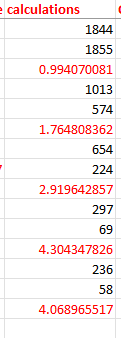
The short story is that far more facilities got worse than better, and the more extreme the deviation from 1, the greater the disparity.
The numbers in red are the odds ratio. So the point is that if a nursing home had a significant measurable change from “normal” after the vaccine rolled out, the odds were over 4:1 that the change would be strongly negative rather than positive.
In short, the vaccine is a disaster.
Before-after odds ratios
This is the same analysis as in the previous section, but the two time periods were non-overlapping, i.e., Odds in Q1 2021 / Odds in H2 2020
From start of data in 6/1/20 until vax rollout on 1/3/21
From 1/3/21 until 4/4/21 (this is the change so it’s non-overlapping)
I expected a much stronger signal here and that’s what I got.
The OR was 1.75 for any change from 1:

And it got worse from there so the stronger the deviation, the more likely it was to be negative, e.g., if the OR of a nursing home was >5, or < .2, it was 3.15 more likely to be an increasing chance of death.
In short, all things being equal, you were nearly twice as likely to find a facility that got worse than better.
Again, a disaster for the vaccine: facilities were much more likely to get worse.
IFR analysis
For the IFR analysis, I went back to aggregating all the data. So instead of counting the number of facilities where the IFR got better or worse, I’m just adding up all the numbers of infections and all the deaths and computing the after/before odds ratio.
This is simple to understand.
I computed the overall IFR on the period before the vax.
I computed the overall IFR on the period after the vax.
That’s it.
If the vax worked, the new IFR should be dramatically lower.
Nope. The IFR increased. Are you surprised?
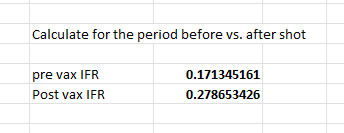
This means that if you get COVID right after you got the vaccine, you are 1.6 times more likely to die (compute from .278/.171)
I also checked for whether this difference was statistically significant using a Fisher Exact test on (cases minus deaths) vs deaths:
>>> analyze(511163, 90467, 21952, 6117, "IFR")
Statistics for IFR 511163 90467 21952 6117
One-sided p-value 9.978816028816743e-189
Odds ratio= 1.5744658622418792
ConfidenceInterval(low=1.52889659236017, high=1.621221062478143)
Again, this is highly statistically significant (p-value of 1e-188) and it appears that it’s very likely that the vaccine will increase your risk of death by 50% or more.
In short, it is making you 1.6X more likely to die, not less likely like they told you.
That’s what the data says.
Ireland study confirms the same rise in mortality effect
In Ireland, different facilities were vaccinated at different times, and in every case, the deaths skyrocketed for 30 days after the vaccines were given, just like in the US. Here’s the aggregated data which is stunning: a 469% increase in deaths in the 2 months the jabs rolled out (and it’s like that for each nursing home individually which you will see if you click through to the study).

Other anecdotes
It’s hard to find positive anecdotes post vaccine rollout.
But it’s easy to find negative anecdotes.
A 35% mortality increase is huge. If the vaccines worked, how can you explain this?
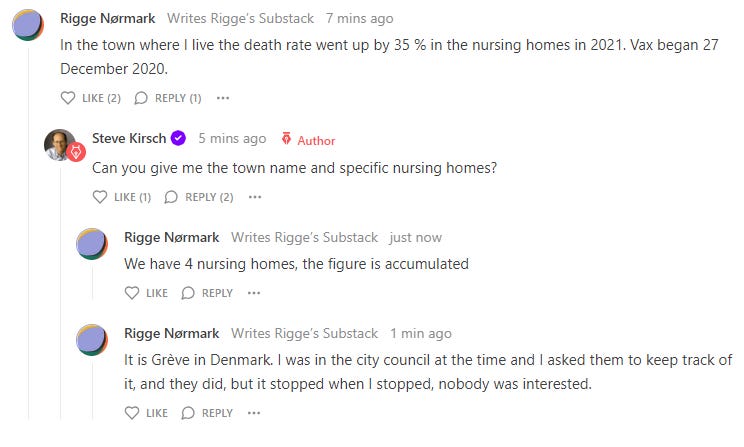
Or how 33% of residents died of COVID right after the vaccines rolled out. If the vaccine worked, that’s simply not possible because: 1) they were all vaccinated and 2) the pre-vaccine IFR for people in nursing homes is around 17%. A 33% death rate in a month is not something that happens by chance.
The 22 people at Basingstoke all died in January 2021 of COVID, yet they were all vaccinated. This is very similar to AVV where there were no COVID deaths reported to CMS until right after the vaccines were given and then the IFR went from 0 to nearly 30%. That’s an impossible jump if the vaccines didn’t cause it.
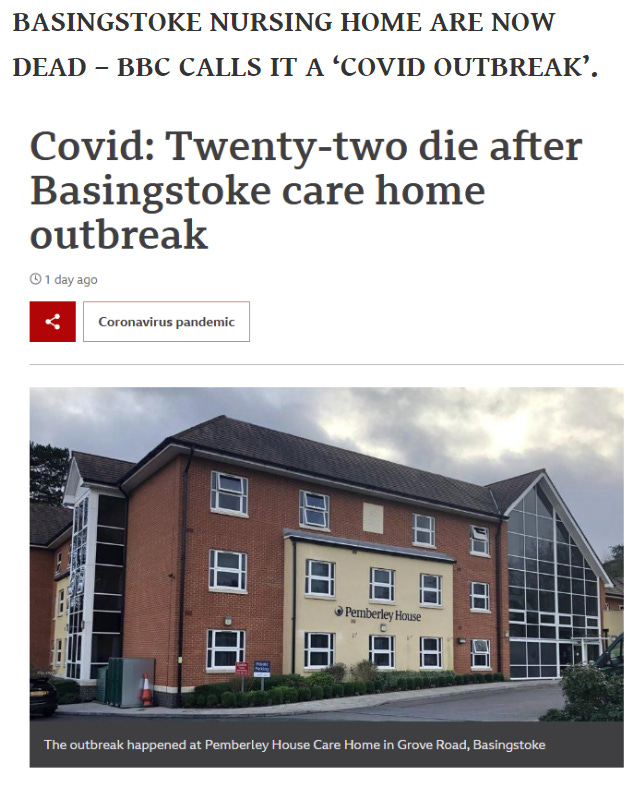
I’m not the first person to notice that after the jabs rolled out, there were many instances of massive numbers of injected people dying from COVID
Check out this article from Feb 25, 2021:
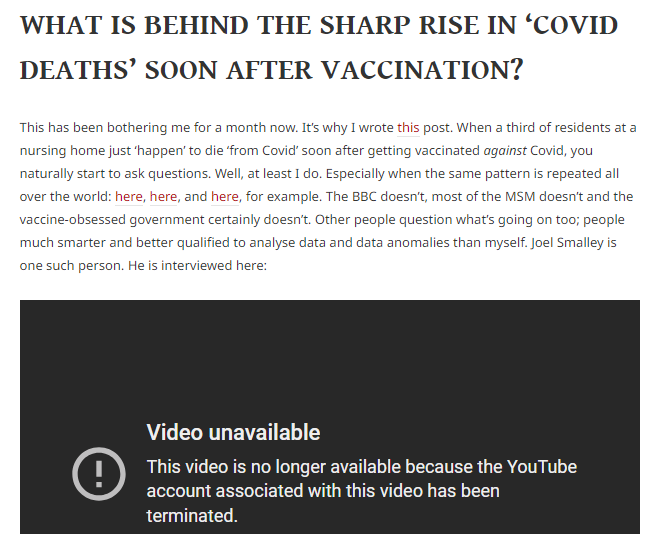
This example is important because nobody can explain what happened there if it wasn’t the vaccine causing this.
What happened:
The facility has 178 beds. Average occupancy in 2020 was 147.
Residents were jabbed on Dec 28 and Dec 29.
On Sunday, Jan 3, employees were urged to return to work immediately to deal with all the people who were dying unexpectedly that happened right after the vaccine rollout.
0 deaths from COVID pre-vaccine (despite 27 cases of COVID) reported to CMS in 2020
Right after the vaccine rolled out, there were 90 COVID cases in just 3 weeks (starting Jan 4, 2021) resulting in a total of 28 deaths from COVID! This is an astonishing increase in the IFR within the same facility and it just happened right after the jab. Coincidence? Look at the Ireland data.
There were 140 occupied beds at the start of Jan 2021. Just 3 weeks later, that number was 93, a reduction of nearly 50 people.
There were 50 all-cause deaths at AVV in January. This is the highest death count EVER at that facility in a month. By comparison, in Jan 2019, there were just 5 deaths total.
According to Medicare records, 246 people died at AVV in 2021. There were only 98 deaths in 2019.
The reason this facility is important is that:
I have data from insiders as to what happened
I have the CMS Nursing Home Data
I have the full death records of everyone who died
I have the full data from Medicare (from HHS) that is not publicly available
I have the names of everyone who died there
There is no hypothesis that fits the data other than:
The vaccine killed residents,
The vaccine made it more likely for the residents to get COVID and die,
The vaccine dramatically increased the IFR on the same variant that didn’t kill anyone before.
You can see this effect very clearly from the “gold standard” Medicare data (pulled from HHS) where both peaks and valleys are higher than before. The high peak was 50 deaths and it happened in Jan 2021, right after the jabs rolled out. That was an all-time high for that facility.
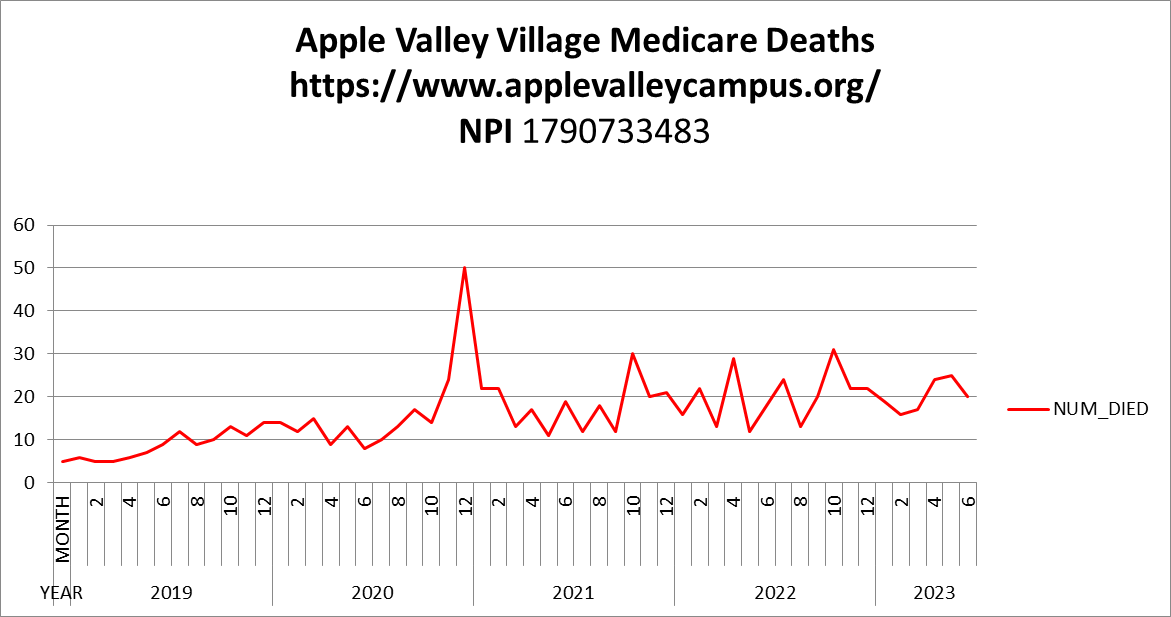
The average monthly all-cause mortality death count at AVV:
2019: 8.2
2020: 13.6
2021: 20.5
2022: 20.1
2023: 20.4
As you can clearly see the troubling news: the deaths per month did not reset back to the baseline rate.
Here are the all-cause mortality counts since 2019 (these are all-cause deaths):
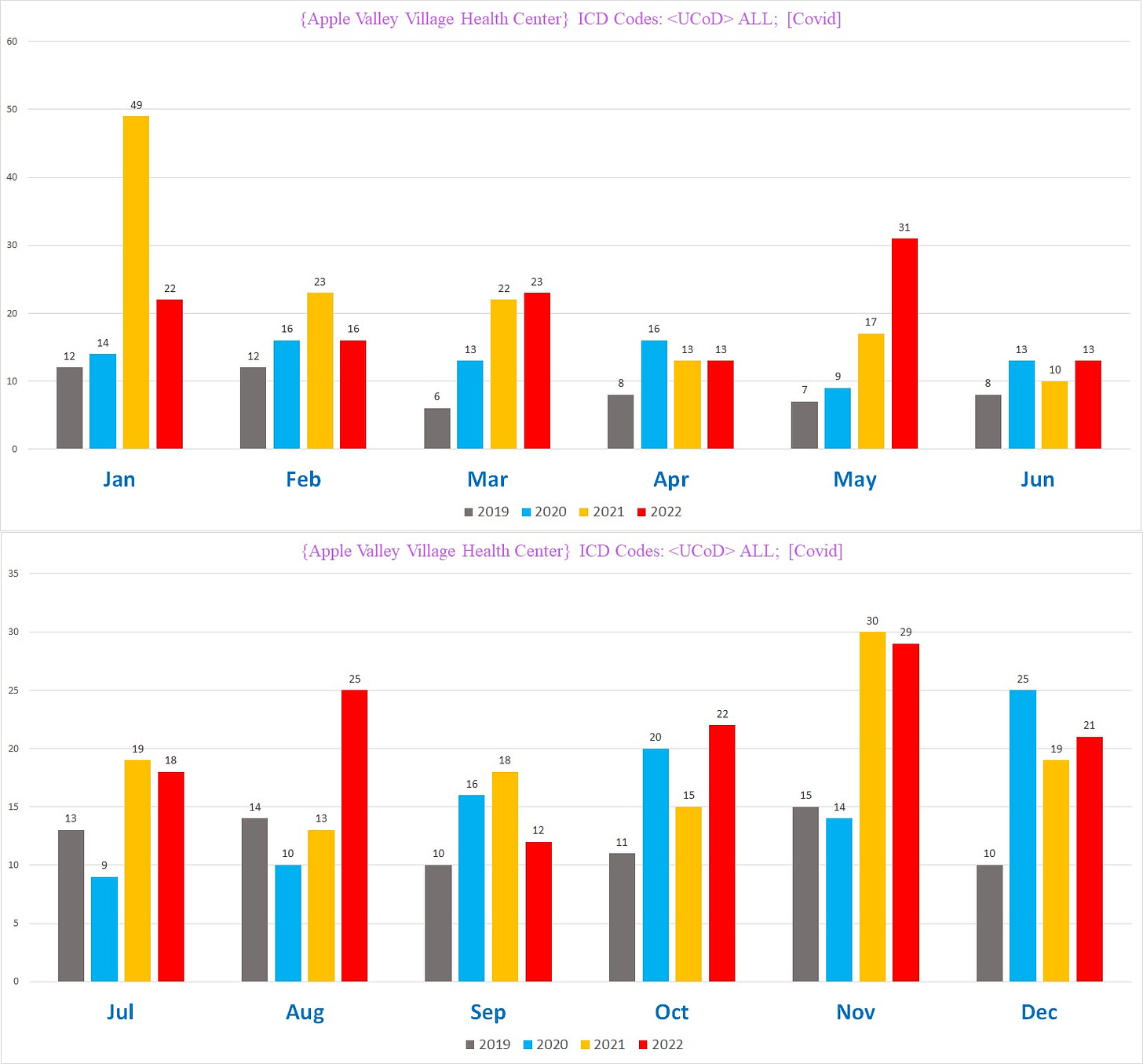
COVID deaths are even more stunning. Nearly all the deaths happened within a period of 3 weeks after the COVID vaccine was given. This chart would be more spectacular if the x-axis were in months instead of years. You would see this giant bar right after the vaccine was given. That’s too big to dismiss as “an anecdote” and we know from an insider that there was panic in the facility after they rolled out the shots due to all the deaths.
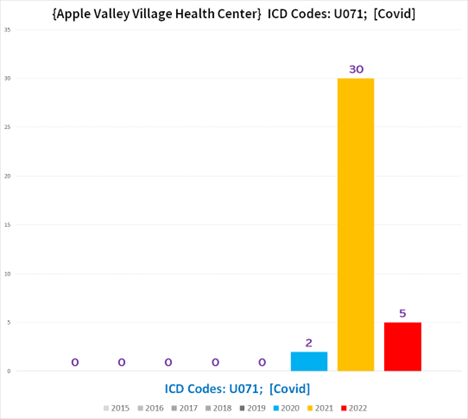
Is my math wrong?
I’m happy to correct any errors, but so far all the feedback is simply ad hominem attacks. If I’m wrong, kindly point out the error and correct value(s).
Can math be used to disprove the “safe and effective” narrative?
This question is open to debate. Apparently, the mainstream thinking goes something like this:
Statistical analysis and the entire world of mathematical proof, when applied to the COVID vaccine is considered “misinformation” if and only if the result of the analysis disproves what the mainstream medical community claims to be true.
Criminal charges
Finally, criminal charges should be filed against AVV and other nursing home facilities where they gave the second jab of the primary series after realizing the first jab was killing people. The staff at the nursing home has a duty of care and it was obvious to the staff at AVV that people were dying in droves after the first shot. To their credit, no staff or resident was required to get the shot.
Yet, even after they knew the jab was deadly, they offered the second shot of the primary series to residents.
This is criminal negligence and people need to go to jail so this doesn’t keep happening.
The PREP act protects against civil liability only. This behavior is criminal. These people are not protected and need to be charged.
I plan on filing a complaint to the proper authorities shortly.
All it will take is one criminal conviction and it will change everything. Any federal, state, or local government attorney can bring these charges. “I was just following orders” doesn’t exonerate these people of liability and neither does the PREP act.
Of course, Congress could simply write a law exempting everyone from criminal liability too. After all, it does seem like the goal is to protect the vaccine, not the public.
This is a big deal: 40% of the COVID deaths are in nursing homes.
The CMS Nursing home dataset I used here is very important because a huge fraction of COVID deaths were in nursing homes at the time of the vaccine rollout:

Where is their analysis?
If the CMS Nursing home data proves the vaccines actually reduced COVID IFR where is their analysis of that? I found no evidence of this and looked at this data many different ways including very unconventional ways.
If the vaccine didn’t kill people, how do they explain the 28% death rate at Annandale on the same day as the shot?
If I’m wrong, why isn’t anyone supporting the narrative publishing their analysis and getting the mainstream medical community to align behind it. I’d like that because it will then create an easy target for us to bring the whole house of cards down by discrediting their analysis.
How can Professor Morris not know the IFR in December 2020 or the IFR for the vaccinated vs unvaccinated in January 2021? The only way he could not know that is he doesn’t have reliable information. So you can’t claim this data is unreliable if you don’t have a gold standard comparison group.
They basically completely avoided looking at whether the vaccine reduces or increases the IFR!
Three key observations:
Their analysis time frame avoids the initial rollout. “This longitudinal cohort study used data on COVID-19 outcomes in Medicare- and Medicaid-certified nursing homes in the US between May 30, 2021, and January 30, 2022.”
They didn’t look at IFR. They observed that both cases and deaths went down. Who cares? What you want to know is whether the vaccines reduced or increased the IFR. The paper doesn’t even look at that at all.
They could only say there was an “association”, not causation. We know from the Cleveland Clinic study that the vaccine doesn’t reduce cases at all; it does the opposite. Yet they wrote, “increasing staff vaccination rates was associated with lower incidence of COVID-19 cases and deaths among residents.” That’s technically true… it was “associated” but it was not causal. It was associated by coincidence. It did not cause the lowered deaths. Look at the title.
This paper concludes that “a lower mortality rate was observed in fully vaccinated residents compared with not fully vaccinated residents.”
It was a retrospective study of 191 people in residential aged care facilities (RACFs) between 9/9/21 and 12/9/21.
They looked at the 28 day mortality rate of those with a positive PCR test. Only 22 people in the group of 191 were fully unvaccinated. 11 people had just one vaccine.
The paper is flawed from the start because we have SURVIVOR bias…. The people in the vaxxed group survived two shots of the vax and lived. So of course they will be less likely to die of COVID. That’s why the IFR before everyone was vaxxed compared to the IFR post-vax is by far the better, more trustable comparison.
The paper mentioned that the likelihood of death was lower for the fully vaccinated as well as the group who had “at least one dose of the vaccine” compared to the unvaccinated.
24 of 158 fully vaccinated people died and 13 of the 33 not fully vaccinated people died. They didn’t break out the death counts of the two groups (one vs. no vax).
We know that proportionally more of the partially vaxxed people died than the unvaxxed people due to table 1 (OR 1.7), but they hid the number.
So it means we have to do some math to reverse engineer what they obfuscated.
So what does that mean? It means that:
They calculated the odds ratio incorrectly (they used 6/11 / (7/22)) which is exactly 1.71 instead using the correct odds ratio of (6/5) / (7/15). The correct OR number is 2.5 which is stunning. In plain English, for every one unvaxxed person who died, 2.5 partially vaxxed people died. It is surprising they miscalculated the odds. That’s pretty basic. It makes you wonder what else they got wrong.
An OR of 2.5 for the one vax group is hard to explain away. That’s very large. The numbers were small, but that is a very large signal in the wrong direction for the narrative.
The OR for 2 doses is expected due to the vaccine survivor bias effect. I don’t know what the correct number is so this is speculation. But they don’t know what it is either.
It’s very interesting that the AZ vaccine performed twice as well as the Pfizer vaccine. That makes perfect sense though… if the “so deadly that they took it off the market in the US” AZ vaccine didn’t kill you, it’s unlikely COVID will.
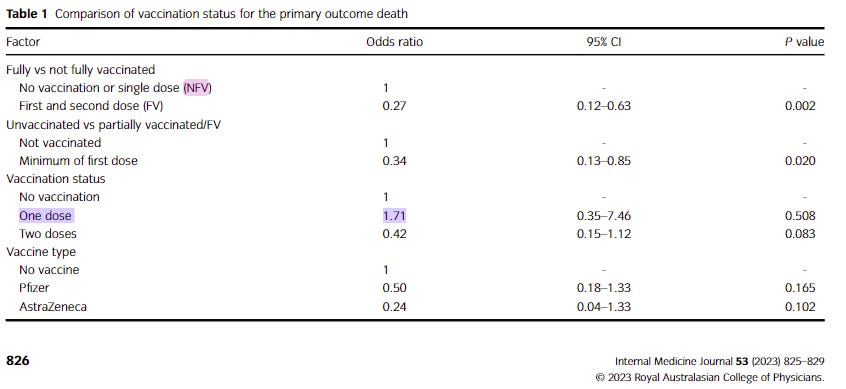
They basically sidestepped the poor showing of the one dose group by lumping the one dose in with the two dose group and then they make the very misleading claim that the “at least one dose” group had a lower death rate.
So the IFRs for the groups were:
Unvaccinated: 7/22=.31
Partially vaxxed: 6/11=.54
Fully vaxxed: 24/158=.15
So the IFR was a stunning 3.6 times higher if you only got one shot. How do they explain that?
Keep in mind also that this study ONLY looks at COVID deaths, no all-cause mortality deaths.
So this paper, which is a small study, doesn’t dispute our findings about what happened to the IFR after the vaccines rolled out in America.
The only way you can dispute the CMS data is using data itself to show there is a problem. With such a large dataset (over 15,000 independent reporters), this is a tough task.
Arguments from UPenn Professor Jeffrey Morris
I got these arguments from The Real Truther who basically relies on Jeffrey Morris to determine what is going on. Here’s the argument from Morris that Truther relayed:
IFR=covid attributed deaths/recorded covid cases and the database as explained on the website does not contain all covid cases -- many were detected off site but they were then transferred to nursing facility after infected so death but not infection recorded in database.
You also make the mistake of not adjusting for confounders. Besides the fact that you cannot compute accurate IFR from this data base, you seem to want to consider the odds ratio of IFR from 2020 to 2021, assuming any difference is caused by vaccination alone. This is why you have to adjust for any confounders, and you can't assume nothing else changed from 2020 to 2021 except vaccines. You also don't even compare IFR for vaccinated vs. unvaccinated.
Also by working with IFR you conveniently ignore that the cases dropped dramatically once the vaccines were rolled out. And of course you pool all the data together -- including both residential long term care facilities and short term facilities in which people are released from hospital when they are too sick to go home (like the two examples you gave) places that have very high death rates especially during covid waves when sick patients are released there and in some cases put on ventilators.
It's apples and oranges and you are saying they are all apples so it's misleading.
This is a hand-waving speculation argument with no evidentiary basis. If you want to make a claim like this, you need to show it with data. Where is the evidence that this makes any difference to the OR calculation? I wasn’t trying to determine an absolutely correct IFR; my IFR is likely somewhat inflated over the true IFR. I was just looking at the odds before vs. after the vaccine. The IFR should have dropped dramatically. It went the wrong way. The dataset isn’t perfect, no dataset is, but there is absolutely no reason that this very tiny effect would affect an OR calculation. Why would the OR jump dramatically right after vaccination and then almost return to normal? It was supposed to drop dramatically.
What confounder which is PROVEN AND KNOWN to affect the IFR did I ignore? If you want to accuse me of ignoring a confounder, you have to name the confounder and show data that it makes a difference and clearly explains why the IFR went up dramatically when it should have gone down. That’s one hell of a confounder! Why can’t you name it and show us the data that it completely reverses the OR?
I used the IFR specifically because it is invariant to the number of cases. The IFR depends on the variant of interest (which didn’t change), the testing rate and overall herd immunity. The latter two change very slowly over time in nursing homes. But what happened was a huge spike in the IFR right after the vaccine rollout.
There is a mix of nursing home facility types in the data, but there was no change in the overall mix in the two periods. So that should not be a factor. If you think it is, you need to show us evidence that this can explain the data observed.
Finally, Truther claims Morris is the smartest guy on Twitter w.r.t. the vaccines.
So it is stunning that hand-waving arguments with no evidentiary support are the best he can do. He needs to show us the proper way to do it and show it totally explains an extreme and sudden elevation of the OR when the OR should have moved dramatically down.
It’s also stunning that he has no clue what the “correct” OR is. NOBODY DOES. How is that possible 2 years after all the data was released?
Were there any confounders? Yes, but they should have moved the IFR downwards. It went up!
The peak IFR rate was in February. Was this because everyone was just testing more because of the enormous death tolls in Nov, Dec 2020 and Jan 2020? More deaths means more vigilance which means way more testing to prevent an outbreak.
Sounds reasonable, right?
But here’s the thing…more testing LOWERS the IFR. The vaccine dramatically lowers the IFR.
Yet the IFR increased dramatically in Feb.
The only way that can happen is if the vaccine caused it.
The data matches the anecdotes
I hear plenty of anecdotes from nursing homes. All of them are consistent with the deadly vaccine hypothesis. The ones highlighted such as Annandale and AVV cannot be explained by the “safe and effective” hypothesis.
My Twitter post
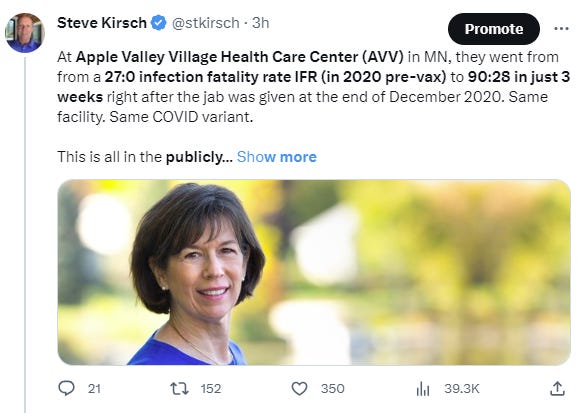
Summary
This CMS data is ground truth data. It simply doesn’t get any better than this dataset: it’s the biggest target audience, the data is fully reported on a per facility basis, and there are over 1M data reports and the data is provided on a record level basis. The data isn’t perfect, it never is, but this data is really “the very best you can get.” You cannot do any better. This is the best.
And this is also the very “best case” analysis where the vaccine should perform at optimum levels and the COVID IFR should have dropped like a rock. Here’s why: in early 2021, the US was still on the original variant so the vaccine matched the variant. Instead of the IFR dropping like they promised, the IFR dramatically increased. The vaccine was a complete bust. It did the opposite. Not only could you die from the shot itself, but it made it more likely you’d get COVID, and more likely for you to die from COVID. In short, it made everything worse.
There wasn’t a single thing that the COVID vaccine did that improved health outcomes.
They promised us that the vaccines would:
Decrease risk of infection
Decrease your risk of dying if you got infected
Even if it did just one of these sufficiently well, it might be a success. But it did neither. It made both worse. And it also increased short and long term risk of all-cause death. It was a quadruple whammy.
There also appears to be a huge QA problem with the batches. Some facilities had an “impossibly high” instant or near instant death rate while other places reported no problem. You can’t have a 25% same-day death rate at one facility and a 0% same-day death rate at another facility if there isn’t a QA problem with batches.
The nursing facilities that saw the huge death rates after dose #1 should never have offered any of their residents Dose #2. They should be held criminally liable for ignoring their duty to protect their residents.
Will this analysis change anyone’s behavior? No, they will just ignore it as they always do because they cannot respond to it. It would just draw public attention to all the harm they’ve caused.
But I thought you should know the truth.


No comments:
Post a Comment